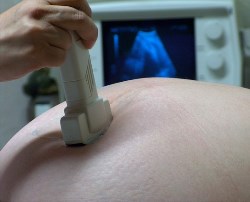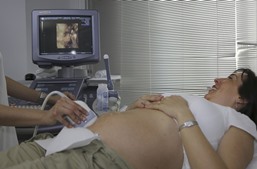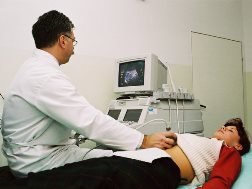How to Enroll in the Best Sonogram Tech Training Program near Dewar Iowa
 Now that you have decided to pursue an ultrasound technician degree near Dewar IA, it’s time to begin the process of picking a school. First, you have to find the ideal program that will provide the necessary education to become a qualified professional. And since some states do require that ultrasound techs be either licensed or certified, depending on where you will practice you may also need preparation to pass a licensing or certification exam. So it’s extremely important that you research each college so that you can assess and compare your alternatives. But exactly where does one start? Many prospective students will begin by searching for schools that are within commuting distance of their homes and then by comparing tuition. Of course cost and location should be considered when making a decision, but there are other significant factors also. For example, if the ultrasound technician schools have earned accreditation or if they provide internship programs. These and other qualifiers will be addressed more in detail later in this article. But to start with, let’s go over what an ultrasound tech does and the degrees and online education options that are available.
Now that you have decided to pursue an ultrasound technician degree near Dewar IA, it’s time to begin the process of picking a school. First, you have to find the ideal program that will provide the necessary education to become a qualified professional. And since some states do require that ultrasound techs be either licensed or certified, depending on where you will practice you may also need preparation to pass a licensing or certification exam. So it’s extremely important that you research each college so that you can assess and compare your alternatives. But exactly where does one start? Many prospective students will begin by searching for schools that are within commuting distance of their homes and then by comparing tuition. Of course cost and location should be considered when making a decision, but there are other significant factors also. For example, if the ultrasound technician schools have earned accreditation or if they provide internship programs. These and other qualifiers will be addressed more in detail later in this article. But to start with, let’s go over what an ultrasound tech does and the degrees and online education options that are available.
Click Here to Get Free Information on Ultrasound Technician Schools!
Ultrasound Technician Occupation Summary
 There are more than one professional titles for ultrasound techs (technicians). They are also referred to as sonogram techs, diagnostic medical sonographers (or just sonographers) and ultrasound technologists. Regardless of name, they all have the same basic job function, which is to carry out diagnostic ultrasound procedures on patients. Although a number of techs work as generalists there are specialties within the field, for example in pediatrics and cardiology. The majority work in Dewar IA hospitals, clinics, outpatient diagnostic imaging centers and even private practices. Standard daily work tasks of an ultrasound technician can involve:
There are more than one professional titles for ultrasound techs (technicians). They are also referred to as sonogram techs, diagnostic medical sonographers (or just sonographers) and ultrasound technologists. Regardless of name, they all have the same basic job function, which is to carry out diagnostic ultrasound procedures on patients. Although a number of techs work as generalists there are specialties within the field, for example in pediatrics and cardiology. The majority work in Dewar IA hospitals, clinics, outpatient diagnostic imaging centers and even private practices. Standard daily work tasks of an ultrasound technician can involve:
- Keeping records of patient medical histories and details of each procedure
- Counseling patients by explaining the procedures and answering questions
- Prepping the ultrasound machines for usage and then sterilizing and recalibrating them
- Escorting patients to treatment rooms and making them comfortable
- Using equipment while minimizing patient exposure to sound waves
- Reviewing the results and identifying necessity for further testing
Sonographers must frequently evaluate the performance and safety of their machines. They also are held to a high professional standard and code of conduct as medical practitioners. So as to sustain that level of professionalism and remain up to date with medical knowledge, they are mandated to complete continuing education courses on a regular basis.
Sonogram Technician Degree Programs Available
 Ultrasound technician enrollees have the choice to earn either an Associate Degree or a Bachelor’s Degree. An Associate Degree will normally take about 18 months to 2 years to finish dependent on the course load and program. A Bachelor’s Degree will require more time at as long as 4 years to complete. Another option for those who have previously earned a college degree is a post graduate certificate program. If you have earned a Bachelor’s Degree in any major or an Associate Degree in a relevant medical sector, you can enroll in a certificate program that will require only 12 to 18 months to finish. One thing to consider is that almost all sonographer schools do have a clinical training component as a portion of their curriculum. It often may be fulfilled by taking part in an internship program which many schools organize with Dewar IA clinics and hospitals. After you have graduated from one of the degree or certificate programs, you will then need to fulfill the certification or licensing prerequisites in Iowa or whatever state you choose to work in.
Ultrasound technician enrollees have the choice to earn either an Associate Degree or a Bachelor’s Degree. An Associate Degree will normally take about 18 months to 2 years to finish dependent on the course load and program. A Bachelor’s Degree will require more time at as long as 4 years to complete. Another option for those who have previously earned a college degree is a post graduate certificate program. If you have earned a Bachelor’s Degree in any major or an Associate Degree in a relevant medical sector, you can enroll in a certificate program that will require only 12 to 18 months to finish. One thing to consider is that almost all sonographer schools do have a clinical training component as a portion of their curriculum. It often may be fulfilled by taking part in an internship program which many schools organize with Dewar IA clinics and hospitals. After you have graduated from one of the degree or certificate programs, you will then need to fulfill the certification or licensing prerequisites in Iowa or whatever state you choose to work in.
Sonogram Tech Online Schools
 As earlier discussed, virtually all sonogram tech schools have a practical requirement to their programs. So although you can obtain a certificate or degree online, a substantial portion of the training will be either carried out in an on campus lab or at a sponsored off-campus facility. Practical training can usually be fulfilled through an internship at a local Dewar IA hospital, outpatient clinic or family practice. However the rest of the training and classes can be accessed online in your Dewar home. This is particularly beneficial for those students that continue working while getting their degrees. In addition online colleges are many times less costly than traditional alternatives. Costs for commuting and study materials may be decreased also. But similarly as with any ultrasound tech school you are looking at, confirm that the online program you enroll in is accredited. One of the most highly regarded accrediting agencies is the Commission on Accreditation of Allied Health Education Programs (CAAHEP). Accreditation is particularly crucial for licensing, certification and finding employment (more on accreditation later). So if you are dedicated enough to attend classes away from the classroom in the comfort of your own home, then an online school may be the right option for you.
As earlier discussed, virtually all sonogram tech schools have a practical requirement to their programs. So although you can obtain a certificate or degree online, a substantial portion of the training will be either carried out in an on campus lab or at a sponsored off-campus facility. Practical training can usually be fulfilled through an internship at a local Dewar IA hospital, outpatient clinic or family practice. However the rest of the training and classes can be accessed online in your Dewar home. This is particularly beneficial for those students that continue working while getting their degrees. In addition online colleges are many times less costly than traditional alternatives. Costs for commuting and study materials may be decreased also. But similarly as with any ultrasound tech school you are looking at, confirm that the online program you enroll in is accredited. One of the most highly regarded accrediting agencies is the Commission on Accreditation of Allied Health Education Programs (CAAHEP). Accreditation is particularly crucial for licensing, certification and finding employment (more on accreditation later). So if you are dedicated enough to attend classes away from the classroom in the comfort of your own home, then an online school may be the right option for you.
What to Ask Ultrasound Technician Colleges
 Once you have determined the type of degree or certificate that you would like to obtain, you can start the procedure of evaluating and comparing sonogram tech colleges. You may first want to choose whether you will attend classes online or travel to a school campus in the Dewar IA area. Of course location will be important if you select the latter, and the cost of tuition no doubt will be an initial qualifier also. But there are other things that you should also take into consideration, for example if the colleges are accredited and if they provide internship programs. Therefore in order to complete your due diligence so that you can make your final selection, below are some questions that you need ask each ultrasound tech college before deciding.
Once you have determined the type of degree or certificate that you would like to obtain, you can start the procedure of evaluating and comparing sonogram tech colleges. You may first want to choose whether you will attend classes online or travel to a school campus in the Dewar IA area. Of course location will be important if you select the latter, and the cost of tuition no doubt will be an initial qualifier also. But there are other things that you should also take into consideration, for example if the colleges are accredited and if they provide internship programs. Therefore in order to complete your due diligence so that you can make your final selection, below are some questions that you need ask each ultrasound tech college before deciding.
Are the Ultrasound Technician Programs Accredited? The majority of ultrasound technician schools have earned some form of accreditation, whether national or regional. Even so, it’s still crucial to confirm that the program and school are accredited. One of the most highly regarded accrediting agencies in the field of sonography is the Joint Review Committee on Education in Diagnostic Medical Sonography (JRC-DMS). Programs receiving accreditation from the JRC-DMS have undergone a rigorous review of their instructors and course materials. If the program is online it may also obtain accreditation from the Distance Education and Training Council, which targets online or distance learning. All accrediting agencies should be acknowledged by the U.S. Department of Education or the Council on Higher Education Accreditation. Besides ensuring a quality education, accreditation will also help in obtaining financial aid and student loans, which are many times not offered for non-accredited colleges. Accreditation can also be a pre-requisite for licensing and certification as required. And a number of Dewar IA employers will only hire graduates of an accredited program for entry-level openings.
Are Internships Offered? Inquire if the ultrasound tech programs you are reviewing have relationships with Dewar IA hospitals or clinics for internship programs. Not only are internships an excellent way to obtain practical experience in a clinical environment, they are additionally a way to satisfy the clinical training requirement for the majority of programs. As an ancillary benefit, they can help students and graduates develop professional connections in the Dewar healthcare community and assist with job placement.
Is Job Placement Assistance offered? You will most likely want to secure employment quickly after graduating, but finding that first job in a new profession can be difficult without support. Find out if the sonographer programs you are interviewing have job placement programs and what their success rates are. Rapid and high placement rates are an excellent sign that the schools have substantial networks and great relationships with Iowa healthcare employers. It also confirms that their graduates are well regarded and sought after.
Where is the School Located? For a number of students, the school they select will need to be within commuting distance of their Dewar IA home. Individuals who have chosen to attend online classes obviously will not have to concern themselves with the location of the campus. However, the availability of local internships will be of importance. One thing to consider is that if you choose to enroll in a program that is out of state or perhaps out of your local area, you may have to pay a higher tuition. State colleges typically charge higher tuitions for out of state residents. And community colleges usually charge a higher tuition for those students that live outside of their districts.
How Big are the Classes ? Unless you are the sort of person that prefers to sit way in the rear of class or get lost in the crowd, you will undoubtedly prefer a smaller class size. Small classes permit more individual participation and one-on-one instruction. Ask the colleges you are considering what the average teacher to student ratio is for their classes. If practical you may want to sit in on one or more classes before making your final decision. This will also give you an opportunity to talk with several of the instructors and students to get their opinions regarding the ultrasound technician program as well.
Can the College Accommodate your Schedule? And last you must verify that the sonographer program you finally pick can furnish the class schedule you need. This is especially important if you choose to continue working while you attend classes. If you must schedule night or weekend classes in the Dewar IA area, make sure that they are offered. If you can only enroll on a part-time basis, verify if that is an option and how many courses or credit hours you would need to carry. Also, find out what the procedure is for making up any classes that you might miss as a result of work, illness or family obligations.
Prenatal Sonography Technician Programs Dewar Iowa
 Picking the ideal ultrasound technician certificate or degree program is a crucial first step to starting a fulfilling new profession providing diagnostic services to patients. Sonographer programs require that you have earned a high school diploma or equivalent. In addition to satisfying academic requirements, you should be in at least fairly good physical condition, capable of standing for lengthy durations with the ability to regularly lift weights of 50 pounds or more, as is it typically necessary to position patients and move heavy machines. Other desirable talents include technical proficiency, the ability to remain levelheaded when confronted by an angry or anxious patient and the ability to converse clearly and compassionately. You originally came to this website due to an interest in Prenatal Sonography Technician Programs and wanting more information on Ultrasound Technician Course. However, as we have covered in this post, there are several questions that you need to ask each college you are considering. This is the case whether you select an online degree or drive to the college campus to attend classes. And by asking the proper questions so that you can compare each school, you can narrow down your alternatives until you are left with the best program for your education. And with the proper training, discipline and motivation to succeed, you can accomplish your objective to work as an ultrasound technologist in Dewar IA.
Picking the ideal ultrasound technician certificate or degree program is a crucial first step to starting a fulfilling new profession providing diagnostic services to patients. Sonographer programs require that you have earned a high school diploma or equivalent. In addition to satisfying academic requirements, you should be in at least fairly good physical condition, capable of standing for lengthy durations with the ability to regularly lift weights of 50 pounds or more, as is it typically necessary to position patients and move heavy machines. Other desirable talents include technical proficiency, the ability to remain levelheaded when confronted by an angry or anxious patient and the ability to converse clearly and compassionately. You originally came to this website due to an interest in Prenatal Sonography Technician Programs and wanting more information on Ultrasound Technician Course. However, as we have covered in this post, there are several questions that you need to ask each college you are considering. This is the case whether you select an online degree or drive to the college campus to attend classes. And by asking the proper questions so that you can compare each school, you can narrow down your alternatives until you are left with the best program for your education. And with the proper training, discipline and motivation to succeed, you can accomplish your objective to work as an ultrasound technologist in Dewar IA.
More Ultrasound Locations in Iowa
Woodward–Hoffmann rules
The Woodward–Hoffmann rules (or the pericyclic selection rules),[1] devised by Robert Burns Woodward and Roald Hoffmann, are a set of rules used to rationalize or predict certain aspects of the stereochemical outcome and activation energy of pericyclic reactions, an important class of reactions in organic chemistry. The Woodward–Hoffmann rules are a consequence of the changes in electronic structure that occur during a pericyclic reaction and are predicated on the phasing of the interacting molecular orbitals. They are applicable to all classes of pericyclic reactions (and their microscopic reverse 'retro' processes), including (1) electrocyclizations, (2) cycloadditions, (3) sigmatropic reactions, (4) group transfer reactions, (5) ene reactions,[2] (6) cheletropic reactions,[3] and (7) dyotropic reactions.[4] Due to their elegance, simplicity, and generality, the Woodward–Hoffmann rules are credited with first exemplifying the power of molecular orbital theory to experimental chemists.[5]
Woodward and Hoffmann developed the pericyclic selection rules by examining correlations between reactant and product orbitals (i.e., how reactant and product orbitals are related to each other by continuous geometric distortions that are functions of the reaction coordinate). They identified the conservation of orbital symmetry as a crucial theoretical principle that dictates the outcome (or feasibility) of a pericyclic process. Other theoretical approaches that lead to the same selection rules have also been advanced. Hoffmann was awarded the 1981 Nobel Prize in Chemistry for elucidating the importance of orbital symmetry in pericyclic reactions, which he shared with Kenichi Fukui. Fukui developed a similar set of ideas within the framework of frontier molecular orbital (FMO) theory. Because Woodward had died two years before, he was not eligible to win what would have been his second Nobel Prize in Chemistry.[6]
A pericyclic reaction is an organic reaction that proceeds via a single concerted and cyclic transition state, the geometry of which allows for the continuous overlap of a cycle of (π and/or σ) orbitals. In the language of orbital symmetry, a pericyclic reaction is termed symmetry-forbidden if there is an additional symmetry-imposed energetic barrier arising from the intended correlation of the ground state electron configuration of the starting material with an excited state electron configuration of the product and vice versa. (Although the non-crossing rule forbids such a correlation, the rise in energy as the intended crossing is approached results in an additional energy barrier nonetheless.) A pericyclic reaction is classified as symmetry-allowed if no such symmetry-imposed barrier exists. Thus, these terms do not imply whether a reaction in question will actually take place. Rather, with all other energetic factors being equal, a symmetry-forbidden process will be impeded by an additional energetic barrier. Although the symmetry-imposed barrier is often formidable (up to ca. 5 eV or 115 kcal/mol in the case of a forbidden [2+2] cycloaddition), the prohibition is not absolute, and symmetry-forbidden reactions can still take place via a pericyclic pathway if other factors (e.g. strain release) favor the reaction. Likewise, a symmetry-allowed reaction may be preempted by an insurmountable energetic barrier resulting from factors unrelated to orbital symmetry.
